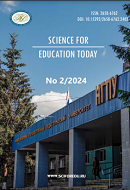Формирование мотивации у студентов к изучению математических дисциплин: эффективность применения контекстных и игровых технологий
Enhancing students’ motivation in studying mathematics disciplines: The effectiveness of applying contextual and gaming technologies
Author(s): Tsyrenkhanda Zhembeevna Yumova, Igor Bimbaevich Yumov, Elena Nikolaevna Bulgatova, Tuyana Igorevna GarmaevaSubject(s): Education, ICT Information and Communications Technologies, Sociology of Education, Pedagogy
Published by: Новосибирский государственный педагогический университет
Keywords: Game technologies; Contextual technologies; Learning motivation; Logical thinking; Contextual learning of mathematics; Practice-oriented competencies;
Summary/Abstract: Introduction. Russian and international research investigations conducted on the problem of using game and contextual technologies in education have proven their effectiveness in obtaining certain knowledge, skills and abilities, as well as developing logical thinking. However, previous works have not suggested effective interactive game and contextual trainings that teach teamwork, improve communication skills and increase students’ interest in studying the subject. The aim of this article is to investigate the effectiveness of using contextual and game technologies in enhancing students’ motivation to studying mathematics disciplines. Materials and Methods. The research was conducted using the following methods: review and analysis of international and Russian scholarly literature on the research problem, tests, questionnaires, educational experiments. Results. The authors studied and analysed Russian and international scholarly literature and conducted theoretical and methodological research. The analysis of test results revealed that the knowledge obtained by means of contextual techniques and games contributes to enhancing motivation to studying mathematics disciplines. The analysis of the survey data showed that technologies are useful in learning, develop logical and analytical thinking, help to develop cognitive abilities, curiosity, attention and intelligence, as well as the ability to acquire knowledge independently. It is emphasized that practice-oriented tasks developed by the authors, aimed at integrating mathematical principles into real situations and problems in various fields of knowledge, facilitate the development of professional competences in future professionals. The authors note that the results of using the developed educational tools were tested in academic groups where the authors conducted practical classes. Conclusions. The article concludes about the effectiveness of using contextual and game learning techniques in developing logical and practice-oriented thinking and encouraging students to study mathematics disciplines.
Journal: Science for Education Today
- Issue Year: 14/2024
- Issue No: 2
- Page Range: 152-178
- Page Count: 27
- Language: Russian

